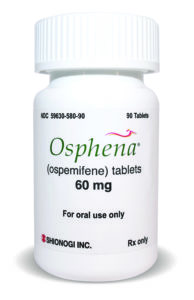Did your mom ever mention in passing that sex might become painful after menopause? Of course she didn’t. But it did, and now even the thought of intercourse sends shivers down your spine, but not in a good way. Who would have ever imagined such a thing!!!!!!!!!

Friend, you’re not alone. Up to 75 percent of postmenopausal women report they have painful sex, said Dr. James A. Simon, Clinical Professor of Obstetrics and Gynecology at George Washington University. You can blame your ovaries, which are no longer delivering the level of estrogen you once needed to get periods and have babies (even if being a mother didn’t interest you). Before menopause, estrogen also helps maintain the thickness, elasticity and lubrication of vaginal tissues.
It’s bad enough that reduced estrogen can bring on hot flashes, night sweats, weight gain, bone loss, mood swings and sleep disturbances. But when sex becomes painful that’s the last straw. It’s called dyspareunia (pronounced dis-pa-roon-ia), which is most often a symptom of Vulvovaginal Atrophy (VVA) due to menopause. Besides painful intercourse, VVA can cause vulvar or vaginal irritation, itching, burning, dryness and light bleeding.

But you don’t have to live with dyspareunia or vaginal dryness. You certainly don’t. You can try treating it with over-the-counter lubricants and moisturizers, suppositories, estrogen therapy or SERMS, which are “non-hormonal, synthetic molecules that bind to estrogen receptors in the body and mimic the effects of estrogen, without being estrogen,” explained Dr. Mary Jane Minkin, Clinical Professor, Department of Obstetrics, Gynecology and Reproductive Sciences, Yale Medical School.
“SERMs are used to treat a variety of medical conditions, but the one used to treat moderate to severe painful sex due to menopause is called ospemifene and is sold under the brand name Osphena, which is an oral pill. Ospemifene helps counteract the changes in your vaginal tissues that resulted from low estrogen levels. By improving the condition of your vaginal tissues, ospemifene makes sex less painful, providing the relief you need without hormones,” Dr. Minkin said.
 The Food and Drug Administration (FDA) also has approved Osphena for the treatment of moderate to severe vaginal dryness. “The FDA’s approval affirms Osphena is safe and effective for treating this symptom of VVA, broadening its benefits to a larger number of menopausal women,” Dr. Simon added.
The Food and Drug Administration (FDA) also has approved Osphena for the treatment of moderate to severe vaginal dryness. “The FDA’s approval affirms Osphena is safe and effective for treating this symptom of VVA, broadening its benefits to a larger number of menopausal women,” Dr. Simon added.
Please don’t be afraid or embarrassed to talk to your doctor if you’re suffering from dyspareunia and/or vaginal dryness. Too many women are, needlessly subjecting themselves to pain and stress. While your hot flashes and night sweats might abate, the symptoms of VVA won’t. They might even get worse.

